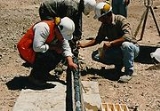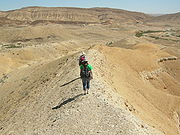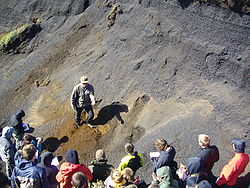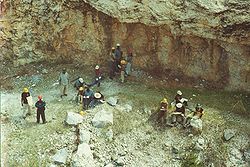
Geologist
Encyclopedia


Scientist
A scientist in a broad sense is one engaging in a systematic activity to acquire knowledge. In a more restricted sense, a scientist is an individual who uses the scientific method. The person may be an expert in one or more areas of science. This article focuses on the more restricted use of the word...
who studies the solid and liquid matter that constitutes the Earth
Earth
Earth is the third planet from the Sun, and the densest and fifth-largest of the eight planets in the Solar System. It is also the largest of the Solar System's four terrestrial planets...
as well as the processes and history that has shaped it. Geologists usually engage in studying geology
Geology
Geology is the science comprising the study of solid Earth, the rocks of which it is composed, and the processes by which it evolves. Geology gives insight into the history of the Earth, as it provides the primary evidence for plate tectonics, the evolutionary history of life, and past climates...
. Geologists, studying more of an applied science than a theoretical one, must approach Geology using physics
Physics
Physics is a natural science that involves the study of matter and its motion through spacetime, along with related concepts such as energy and force. More broadly, it is the general analysis of nature, conducted in order to understand how the universe behaves.Physics is one of the oldest academic...
, chemistry
Chemistry
Chemistry is the science of matter, especially its chemical reactions, but also its composition, structure and properties. Chemistry is concerned with atoms and their interactions with other atoms, and particularly with the properties of chemical bonds....
and biology
Biology
Biology is a natural science concerned with the study of life and living organisms, including their structure, function, growth, origin, evolution, distribution, and taxonomy. Biology is a vast subject containing many subdivisions, topics, and disciplines...
as well as other sciences. Geologists, compared to scientists engaged in other fields, are generally more exposed to the outdoors than staying in laboratories; although some geologists prefer to perform most of their studies in the lab.
Geologists are engaged in exploration for mining
Mining
Mining is the extraction of valuable minerals or other geological materials from the earth, from an ore body, vein or seam. The term also includes the removal of soil. Materials recovered by mining include base metals, precious metals, iron, uranium, coal, diamonds, limestone, oil shale, rock...
companies in search of metals, oils, and other Earth resources. They are also in the forefront of natural hazards and disasters warning and mitigation, studying earthquake
Earthquake
An earthquake is the result of a sudden release of energy in the Earth's crust that creates seismic waves. The seismicity, seismism or seismic activity of an area refers to the frequency, type and size of earthquakes experienced over a period of time...
s, volcanic activity, tsunami
Tsunami
A tsunami is a series of water waves caused by the displacement of a large volume of a body of water, typically an ocean or a large lake...
s, weather storms, and the like; their studies are used to warn the general public of the occurrence of these events. Currently, geologists are also the scientists most engaged in the discussion of climate change
Climate change
Climate change is a significant and lasting change in the statistical distribution of weather patterns over periods ranging from decades to millions of years. It may be a change in average weather conditions or the distribution of events around that average...
, being the ones who hold the history and evidence for this Earth process.
Training / Schooling

Physics
Physics is a natural science that involves the study of matter and its motion through spacetime, along with related concepts such as energy and force. More broadly, it is the general analysis of nature, conducted in order to understand how the universe behaves.Physics is one of the oldest academic...
, mathematics
Mathematics
Mathematics is the study of quantity, space, structure, and change. Mathematicians seek out patterns and formulate new conjectures. Mathematicians resolve the truth or falsity of conjectures by mathematical proofs, which are arguments sufficient to convince other mathematicians of their validity...
, and chemistry, in addition to classes offered through the geology
Geology
Geology is the science comprising the study of solid Earth, the rocks of which it is composed, and the processes by which it evolves. Geology gives insight into the history of the Earth, as it provides the primary evidence for plate tectonics, the evolutionary history of life, and past climates...
department; historical and physical geology, igneous and metamorphic petrology
Petrology
Petrology is the branch of geology that studies rocks, and the conditions in which rocks form....
and petrography, hydrogeology
Hydrogeology
Hydrogeology is the area of geology that deals with the distribution and movement of groundwater in the soil and rocks of the Earth's crust, . The term geohydrology is often used interchangeably...
, sedimentology
Sedimentology
Sedimentology encompasses the study of modern sediments such as sand, mud , and clay, and the processes that result in their deposition. Sedimentologists apply their understanding of modern processes to interpret geologic history through observations of sedimentary rocks and sedimentary...
, stratigraphy
Stratigraphy
Stratigraphy, a branch of geology, studies rock layers and layering . It is primarily used in the study of sedimentary and layered volcanic rocks....
, mineralogy
Mineralogy
Mineralogy is the study of chemistry, crystal structure, and physical properties of minerals. Specific studies within mineralogy include the processes of mineral origin and formation, classification of minerals, their geographical distribution, as well as their utilization.-History:Early writing...
, palaeontology, physical geography
Physical geography
Physical geography is one of the two major subfields of geography. Physical geography is that branch of natural science which deals with the study of processes and patterns in the natural environment like the atmosphere, biosphere and geosphere, as opposed to the cultural or built environment, the...
and structural geology
Structural geology
Structural geology is the study of the three-dimensional distribution of rock units with respect to their deformational histories. The primary goal of structural geology is to use measurements of present-day rock geometries to uncover information about the history of deformation in the rocks, and...
are among the many required areas of study. Most geologists also need skills in GIS
Geographic Information System
A geographic information system, geographical information science, or geospatial information studies is a system designed to capture, store, manipulate, analyze, manage, and present all types of geographically referenced data...
and other map
Map
A map is a visual representation of an area—a symbolic depiction highlighting relationships between elements of that space such as objects, regions, and themes....
ping techniques. Geology students often spend portions of the year, especially the summer though sometimes during a January term, living and working under field conditions with faculty members (often referred to as "field camp"). Many non-geologists often take geology courses or have expertise in geology that they find valuable to their fields; this is common in the fields of geography
Geography
Geography is the science that studies the lands, features, inhabitants, and phenomena of Earth. A literal translation would be "to describe or write about the Earth". The first person to use the word "geography" was Eratosthenes...
, engineering
Engineering
Engineering is the discipline, art, skill and profession of acquiring and applying scientific, mathematical, economic, social, and practical knowledge, in order to design and build structures, machines, devices, systems, materials and processes that safely realize improvements to the lives of...
, chemistry
Chemistry
Chemistry is the science of matter, especially its chemical reactions, but also its composition, structure and properties. Chemistry is concerned with atoms and their interactions with other atoms, and particularly with the properties of chemical bonds....
, urban planning
Urban planning
Urban planning incorporates areas such as economics, design, ecology, sociology, geography, law, political science, and statistics to guide and ensure the orderly development of settlements and communities....
, environmental studies
Environmental studies
Environmental studies is the academic field which systematically studies human interaction with the environment. It is a broad interdisciplinary field of study that includes the natural environment, built environment, and the sets of relationships between them...
, among others.
Areas of specialization
Geologists may concentrate their studies or research in one or more of the following disciplines:- Dendrochonology: the study of dating based on tree ring patterns.
- Economic geologyEconomic geologyEconomic geology is concerned with earth materials that can be used for economic and/or industrial purposes. These materials include precious and base metals, nonmetallic minerals, construction-grade stone, petroleum minerals, coal, and water. The term commonly refers to metallic mineral deposits...
: the study of ore genesisOre genesisThe various theories of ore genesis explain how the various types of mineral deposits form within the Earth's crust. Ore genesis theories are very dependent on the mineral or commodity....
, and the mechanisms of ore creation, geostatisticsGeostatisticsGeostatistics is a branch of statistics focusing on spatial or spatiotemporal datasets. Developed originally to predict probability distributions of ore grades for mining operations, it is currently applied in diverse disciplines including petroleum geology, hydrogeology, hydrology, meteorology,...
. - Engineering geologyEngineering geologyEngineering geology is the application of the geologic sciences to engineering practice for the purpose of assuring that the geologic factors affecting the location, design, construction, operation and maintenance of engineering works are recognized and adequately provided for...
: application of the geologic sciences to engineering practice for the purpose of assuring that the geologic factors affecting the location, design, construction, operation and maintenance of engineering works are recognized and adequately provided for; - GeophysicsGeophysicsGeophysics is the physics of the Earth and its environment in space; also the study of the Earth using quantitative physical methods. The term geophysics sometimes refers only to the geological applications: Earth's shape; its gravitational and magnetic fields; its internal structure and...
: the applied branch deals with the application of physical methods such as gravity, seismicity, electricity, magnetic properties to study the earth. - GeochemistryGeochemistryThe field of geochemistry involves study of the chemical composition of the Earth and other planets, chemical processes and reactions that govern the composition of rocks, water, and soils, and the cycles of matter and energy that transport the Earth's chemical components in time and space, and...
: the applied branch deals with the study of the chemical makeup and behaviour of rocks, and the study of the behaviour of their minerals. - GeochronologyGeochronologyGeochronology is the science of determining the age of rocks, fossils, and sediments, within a certain degree of uncertainty inherent to the method used. A variety of dating methods are used by geologists to achieve this, and schemes of classification and terminology have been proposed...
: the study of isotope geology specifically toward determining the date within the past of rock formation, metamorphismMetamorphismMetamorphism is the solid-state recrystallization of pre-existing rocks due to changes in physical and chemical conditions, primarily heat, pressure, and the introduction of chemically active fluids. Mineralogical, chemical and crystallographic changes can occur during this process...
, mineralization and geological events (notably, meteorite impacts). - GeomorphologyGeomorphologyGeomorphology is the scientific study of landforms and the processes that shape them...
: the study of landforms and the processes that create them - HydrogeologyHydrogeologyHydrogeology is the area of geology that deals with the distribution and movement of groundwater in the soil and rocks of the Earth's crust, . The term geohydrology is often used interchangeably...
: the study of the origin, occurrence and movement of groundwater water in a subsurface geological system. - Igneous petrologyPetrologyPetrology is the branch of geology that studies rocks, and the conditions in which rocks form....
: the study of igneous processes such as igneous differentiationIgneous differentiationIn geology, igneous differentiation is an umbrella term for the various processes by which magmas undergo bulk chemical change during the partial melting process, cooling, emplacement or eruption.-Primary melts:...
, fractional crystallizationFractional crystallization (geology)Fractional crystallization is one of the most important geochemical and physical processes operating within the Earth's crust and mantle. Fractional crystallization is the removal and segregation from a melt of mineral precipitates; except in special cases, removal of the crystals changes the...
, intrusive and volcanological phenomena . - Isotope geology: the study of the isotopic composition of rocks to determine the processes of rock and planetary formation.
- MetamorphicMetamorphic rockMetamorphic rock is the transformation of an existing rock type, the protolith, in a process called metamorphism, which means "change in form". The protolith is subjected to heat and pressure causing profound physical and/or chemical change...
petrology: the study of the effects of metamorphism on minerals and rocks. - Marine geologyMarine geologyMarine geology or geological oceanography involves geophysical, geochemical, sedimentological and paleontological investigations of the ocean floor and coastal margins...
: the study of the seafloor; involves geophysical, geochemical, sedimentological and paleontological investigations of the ocean floor and coastal margins. Marine geology has strong ties to physical oceanography and plate tectonics. - Palaeoclimatology: the application of geological science to determine the climatic conditions present in the Earth's atmosphere within the Earth's history.
- Palaeontology: the classification and taxonomy of fossils within the geological record and the construction of a palaeontological history of the Earth.
- PedologyPedologyPedology may refer to:*Pedology *Pedology *Pediatrics...
: the study of soil, soil formation, and regolithRegolithRegolith is a layer of loose, heterogeneous material covering solid rock. It includes dust, soil, broken rock, and other related materials and is present on Earth, the Moon, some asteroids, and other terrestrial planets and moons.-Etymology:...
formation. - Petroleum geologyPetroleum geologyPetroleum geology refers to the specific set of geological disciplines that are applied to the search for hydrocarbons .-Sedimentary basin analysis:...
: the study of sedimentary basinSedimentary basinThe term sedimentary basin is used to refer to any geographical feature exhibiting subsidence and consequent infilling by sedimentation. As the sediments are buried, they are subjected to increasing pressure and begin the process of lithification...
s applied to the search for hydrocarbons (oil explorationOil explorationHydrocarbon exploration is the search by petroleum geologists and geophysicists for hydrocarbon deposits beneath the Earth's surface, such as oil and natural gas...
). - SedimentologySedimentologySedimentology encompasses the study of modern sediments such as sand, mud , and clay, and the processes that result in their deposition. Sedimentologists apply their understanding of modern processes to interpret geologic history through observations of sedimentary rocks and sedimentary...
: the study of sedimentary rocks, strataStratumIn geology and related fields, a stratum is a layer of sedimentary rock or soil with internally consistent characteristics that distinguish it from other layers...
, formations, eustasy and the processes of modern day sedimentary and erosive systems. - Structural geologyStructural geologyStructural geology is the study of the three-dimensional distribution of rock units with respect to their deformational histories. The primary goal of structural geology is to use measurements of present-day rock geometries to uncover information about the history of deformation in the rocks, and...
: the study of foldsFold (geology)The term fold is used in geology when one or a stack of originally flat and planar surfaces, such as sedimentary strata, are bent or curved as a result of permanent deformation. Synsedimentary folds are those due to slumping of sedimentary material before it is lithified. Folds in rocks vary in...
, faults, foliationFoliation (geology)Foliation is any penetrative planar fabric present in rocks. Foliation is common to rocks affected by regional metamorphic compression typical of orogenic belts. Rocks exhibiting foliation include the standard sequence formed by the prograde metamorphism of mudrocks; slate, phyllite, schist and...
and rock microstructureRock microstructureRock microstructure includes the texture of a rock and the small scale rock structures. The words "texture" and "microstructure" are interchangeable, with the latter preferred in modern geological literature...
to determine the deformational history of rocks and regions. - VolcanologyVolcanologyVolcanology is the study of volcanoes, lava, magma, and related geological, geophysical and geochemical phenomena. The term volcanology is derived from the Latin word vulcan. Vulcan was the ancient Roman god of fire....
: the study of volcanoVolcano2. Bedrock3. Conduit 4. Base5. Sill6. Dike7. Layers of ash emitted by the volcano8. Flank| 9. Layers of lava emitted by the volcano10. Throat11. Parasitic cone12. Lava flow13. Vent14. Crater15...
es, their eruptions, lavaLavaLava refers both to molten rock expelled by a volcano during an eruption and the resulting rock after solidification and cooling. This molten rock is formed in the interior of some planets, including Earth, and some of their satellites. When first erupted from a volcanic vent, lava is a liquid at...
s, magmaMagmaMagma is a mixture of molten rock, volatiles and solids that is found beneath the surface of the Earth, and is expected to exist on other terrestrial planets. Besides molten rock, magma may also contain suspended crystals and dissolved gas and sometimes also gas bubbles. Magma often collects in...
processes and hazards.
Employment

Local, state, and national governments hire geologists to work on geological projects that are of interest to the public community. The investigation of a country's natural resources is often a key role when working for government institutions; the work of the geologist in this field can be made publicly available to help the community make more informed decisions related to the exploitation of resources, management of the environment and the safety of critical infrastructure - all of which is expected to bring greater wellbeing to the country. This 'wellbeing' is often in the form of greater tax revenues from new or extended mining projects or through better infrastructure and/or natural disaster planning.
An engineering geologist
Engineering geologist
An engineering geologist is a geologist trained in the discipline of engineering geology. Many organizations and governments have programs for the qualification, testing and certification of engineering geologists as a protection to the public....
is employed to investigate geologic hazards
Geologic hazards
A geologic hazard is one of several types of adverse geologic conditions capable of causing damage or loss of property and life. These hazards consist of sudden phenomena and slow phenomena:Sudden phenomena include:...
and geologic constraints for the planning, design and construction of public and private engineering projects, forensic and post-mortem studies, and environmental impact analysis. Exploration geologists use all aspects of geology and geophysics to locate and study natural resources. In many countries or US states without specialized environmental remediation licensure programs, such as Rhode Island and North Carolina, the environmental remediation field is often dominated by professional geologists, particularly hydrogeologists, with professional concentrations in this aspect of the field. Petroleum
Petroleum
Petroleum or crude oil is a naturally occurring, flammable liquid consisting of a complex mixture of hydrocarbons of various molecular weights and other liquid organic compounds, that are found in geologic formations beneath the Earth's surface. Petroleum is recovered mostly through oil drilling...
and mining
Mining
Mining is the extraction of valuable minerals or other geological materials from the earth, from an ore body, vein or seam. The term also includes the removal of soil. Materials recovered by mining include base metals, precious metals, iron, uranium, coal, diamonds, limestone, oil shale, rock...
companies use mudloggers
Mud logging
Mud logging, also known as hydrocarbon well logging, is the creation of a detailed record of a borehole by examining the bits of rock or sediment brought to the surface by the circulating drilling medium . Mud logging is usually performed by a third-party mud logging company...
and large-scale land developers use the skills of geologists and engineering geologists to help them locate oil and minerals, adapt to local features such as karst
KARST
Kilometer-square Area Radio Synthesis Telescope is a Chinese telescope project to which FAST is a forerunner. KARST is a set of large spherical reflectors on karst landforms, which are bowlshaped limestone sinkholes named after the Kras region in Slovenia and Northern Italy. It will consist of...
topography or earthquake
Earthquake
An earthquake is the result of a sudden release of energy in the Earth's crust that creates seismic waves. The seismicity, seismism or seismic activity of an area refers to the frequency, type and size of earthquakes experienced over a period of time...
risk, and comply with environmental regulations.
Geologists in academia usually hold an advanced degree in a specialized area within their geological discipline and are employed by universities.
See also

- List of geologists
- List of Russian geologists
- Petroleum geologistPetroleum geologistA petroleum geologist is an occupation that involves all aspects of oil discovery and production in the field of petroleum geology. Petroleum geologists are usually linked to the actual discovery of oil and the identification of possible oil deposits or leads. It can be a very labor intensive task...

